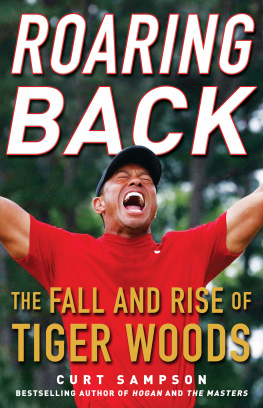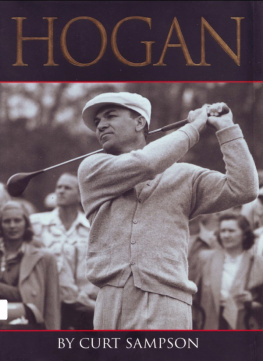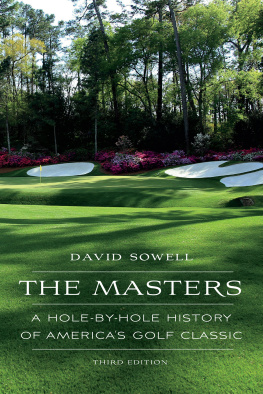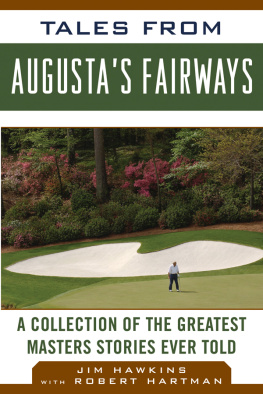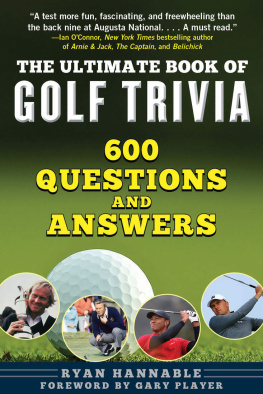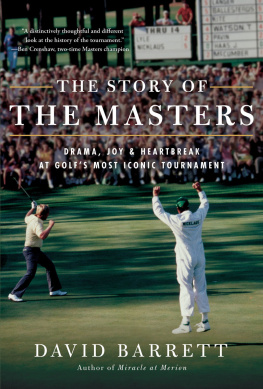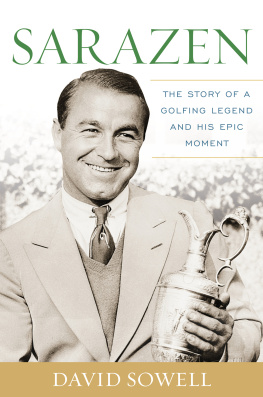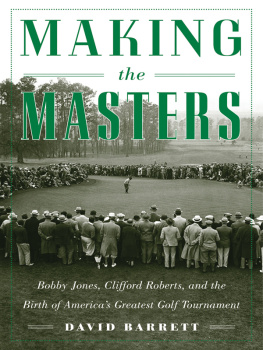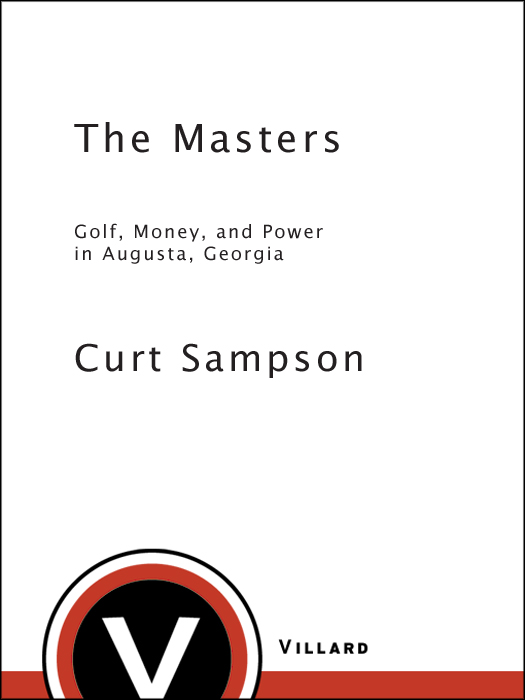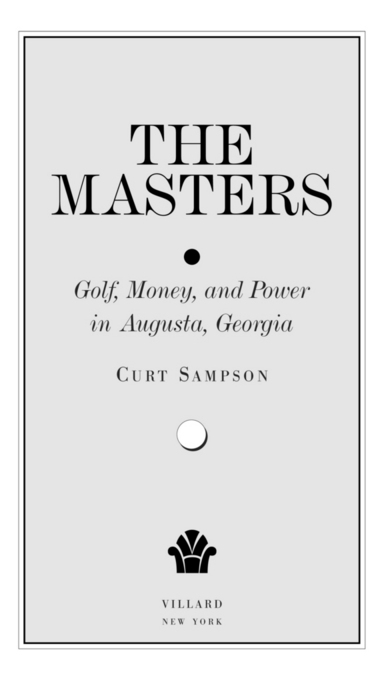Also by Curt Sampson
Hogan
Texas Golf Legends
The Eternal Summer:
Palmer, Hogan, and Nicklaus in 1960,
Golfs Golden Year
Full Court Pressure
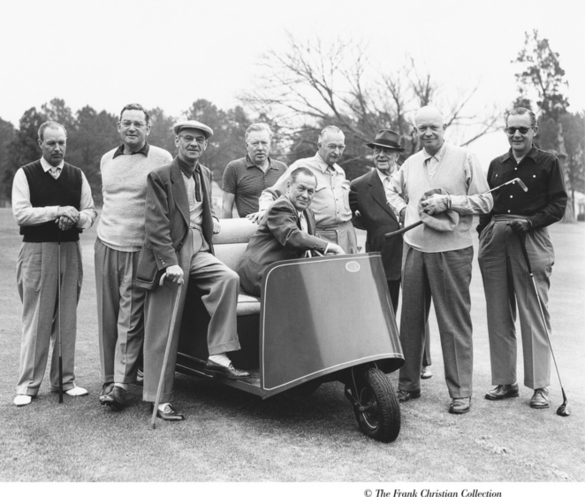
President Eisenhower poses with a few of his Gang.
Copyright 1998, 1999 by Curt Sampson
All rights reserved under International and Pan-American Copyright Conventions. Published in the United States by Villard Books, a division of Random House, Inc., New York, and simultaneously in Canada by Random House of Canada Limited, Toronto.
V ILLARD B OOKS and colophon are registered trademarks
of Random House, Inc.
Originally published in hardcover and in slightly different form by
Villard Books, a division of Random House, Inc., in 1998.
Grateful acknowledgment is made to the following for
permission to reprint previously published material:
B ANTAM D OUBLEDAY D ELL P UBLISHING G ROUP , I NC.:
Excerpt from The Story of the Augusta National Golf Club by Clifford Roberts. Reprinted by permission of Doubleday, a division of Bantam Doubleday Dell Publishing Group, Inc.
L OS A NGELES T IMES S YNDICATE: White as the Ku Klux Klan
by Jim Murray. Copyright 1969 by Los Angeles
Times. Reprinted by permission.
Library of Congress Cataloging-in-Publication Data
Sampson, Curt.
The Masters: golf, money, and power in Augusta, Georgia /
by Curt Sampson.
p. cm.
eISBN: 978-0-307-77619-8
1. Masters Golf Tournament (Augusta, Ga.)History. 2. Augusta National Golf ClubHistory. I. Title.
GV970.S25 1998
796.35206075864dc21 97-49143
Random House website address: www.atrandom.com
v3.1
In memory of Dave Marr
The reasonable man adapts himself to the world.
The unreasonable one persists in trying to adapt
the world to himself. Therefore all progress
depends on the unreasonable man.
George Bernard Shaw
I forgot everything I remember.
Dan Williams, one of the builders of
Augusta National Golf Club
ACKNOWLEDGMENTS
The Club operates under established customs
(rather than rules) the spirit of which all
members are expected to observe. The
principal points are as follows
2. The Club wants no publicity except with
respect to the Masters Tournament. Our
members wish to enjoy the seclusion of a private
club and prefer their visits at the Club not to be
publicized. It is expected that [members]
shall actively discourage any form of publicity
pertaining to the Club, about which they
have advance knowledge, if it is unrelated
to the tournamentand especially if it
is to be commercial in form.
from the Annual Report to Members
M r. X, could you help me find out the year Jock Whitney and Freeman Gosden joined? Mr. X, like every Augusta National member Ive met, is a warm and gracious man, quite the opposite of the clubs cold, stuffy reputation.
Hows your golf game? he replied.
A Masters employee sat with me at a table in the plaza near the main entrance while hundreds of people swirled around us. He swiveled his head left and right as we talked, and at one point he leaned so far forward that I thought he was going to take a bite of my sandwich.
The point of this preamble is that a lot of people who might have helped with this book didnt, and a lot of others who did didnt want to be identified.
A partial list of those I wish to thank must begin with Bill Earley, Danny and Jan Fitzgerald, Sid Matthew, John Strawn, Robert R. Sampson, and several indispensable Anonymouses, all of whom dropped what they were doing to come to my aid on numerous occasions. Thanks too, to:
Golfers: Al Besselink, Jack Burke, Jr., David Duval, Bruce Fleisher, Gilbert Freeman, Freddie Haas, Fred Hawkins, Bill Hyndman, Herman Keiser, Dave Marr, Byron Nelson, Jack Nicklaus, Arnold Palmer, Skee Riegel, Paul Runyan, Gene Sarazen, Charlie Sifford, Frank Stranahan, Art Wall, Tom Weiskopf, and Mickey Wright.
Writers: Jim Apfelbaum, Bill Babb, Ward Clayton, Jaime Diaz, Jim Dodson, Bill Fields, John Helyar, Mike Hiestand, Steve Oney, Mike Purkey, Rick Reilly, John Steinbreder, Mark Stewart, and Ron Whitten.
Historians: Robert Boyd, Reginald Butler, Edward Cashin, Burt Darden, Vicki Greene, Julie Ketterer, Lynn King, Jerry Matheis, Erick Montgomery, Patty Moran, John Naglich, Barbara K. Ordway, Caleb Roehrig, Mike and Lou Rucker, Bob Zimmerman, and from the Columbia University Oral History Research Office, Mary Marshall Clarke and Anne M. Gefell (for, among other things, allowing me to quote from Clifford Roberts interviews in the Eisenhower Administration Oral History).
Grass and tree experts: George Blakeslee, Ed Connors, Pete Cookingham, Lloyd McKenzie, Patrick M. OBrien, Tom Schanher, Dr. Jim Watson, and Tim White.
France: Danielle DeLange, Andre Fauchon, and Terry Stotts.
Architects: John La Foy and Desmond Muirhead.
TV: Frank Chirkinian, John Derr, Mitch Sado, Pat Summerall, and Ben Wright.
Medical: Dr. Allan Martin and Dr. Cheryl Sampson.
Fashion: Jan Strimple.
Finally, a special thank you to Glenn Greenspan of Augusta National; Doc Giffin; Scott Tolley of Golden Bear; Jim Donovan Literary; Peter Gethers and Amy Scheibe of Villard; and to Cheryl, Clay, and John.
CONTENTS
Afterword:
A Cold, Green Shoulder
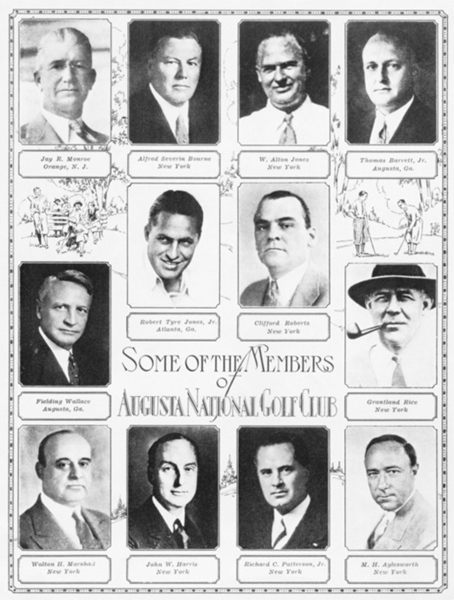
The 1934 Annual Invitation Tournament program.
INTRODUCTION
C harles de Clifford Roberts, Jr., sat in his apartment on Park Avenue and East Sixty-first, a seventy-four-year-old man with a polished scalp, blue eyes, and a whiskey-reddened nose. Never an imposing man physicallyfive-nine in his primeRoberts had shrunk with age, surrendering about an inch. He drank a glass of burgundy in the late afternoon, and as he surveyed his domain, he moved his head in a birdlike way, trying to choose the right view through his trifocals.
His apartment building didnt impress much, either, just a fourteen-story brown brick rectangle with a plain-Jane faade. New York City had hundreds just like it. But 535 Park Avenue was a prestigious address, and expensive. Two uniformed doormen attended the entrance, and Central Park loomed just two blocks to the west. Roberts could go to his window, incline his head to the left, and if he wished to, see huge elms and oaks, prematurely crimson and orange in the cold fall of 1968.
Roberts sat alone. Once hed been a social dynamo in his adopted hometown. His days between the wars and after World War II had been filled with business lunches and golf games at either of his two clubs, Blind Brook and Deepdale near New York City, or at Maidstone or National Golf Links, a hundred miles away on Long Island. At night, he playedexpertlyin the Two-Cent Bridge Club. From time to time he took in a fight at Madison Square Garden. Now, with so many of his cronies dead or retired to a warmer place, he didnt go out much.


